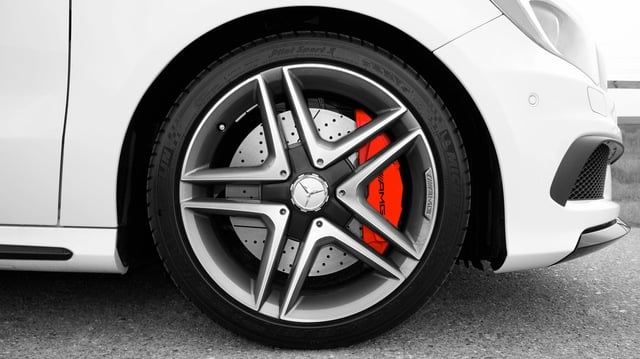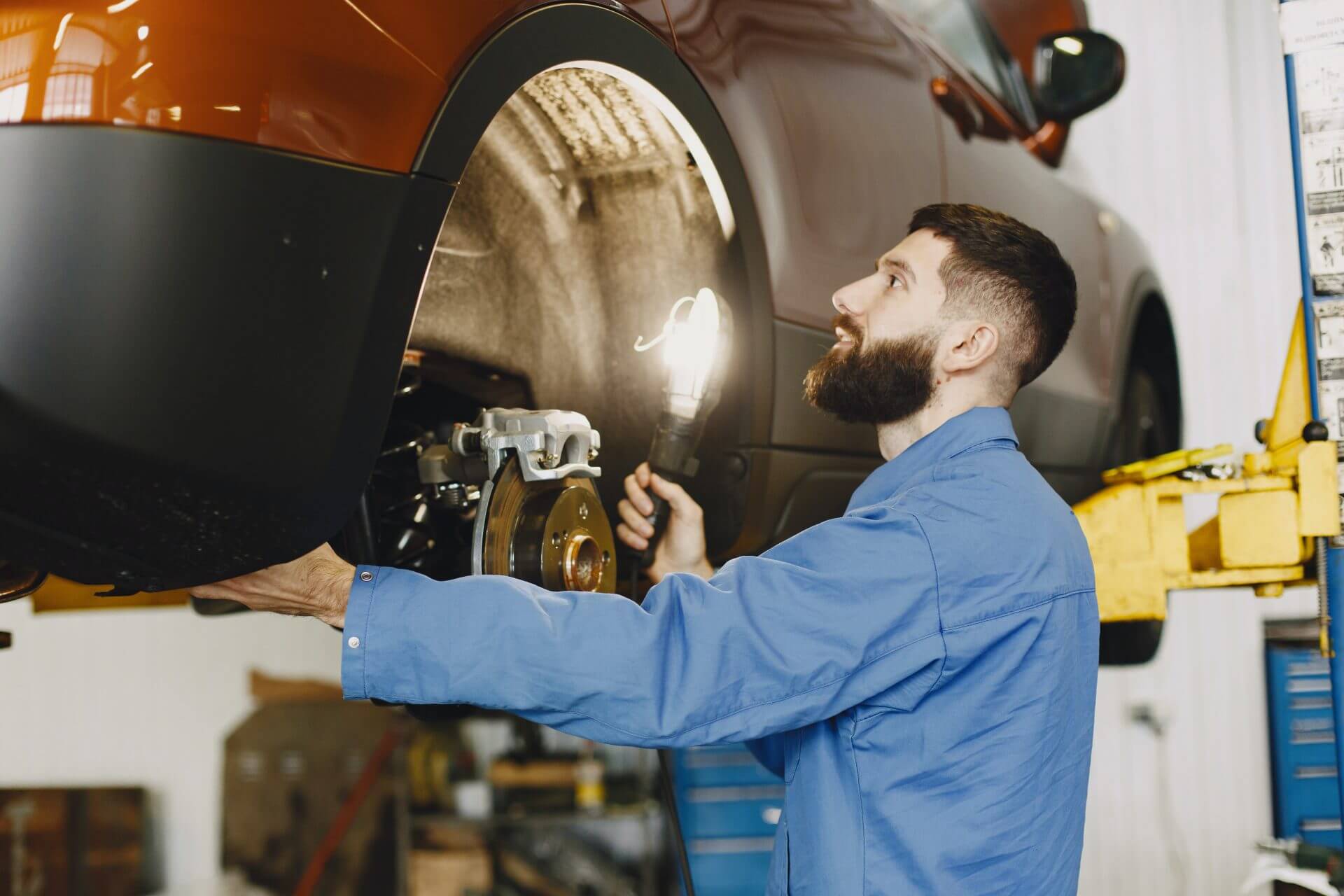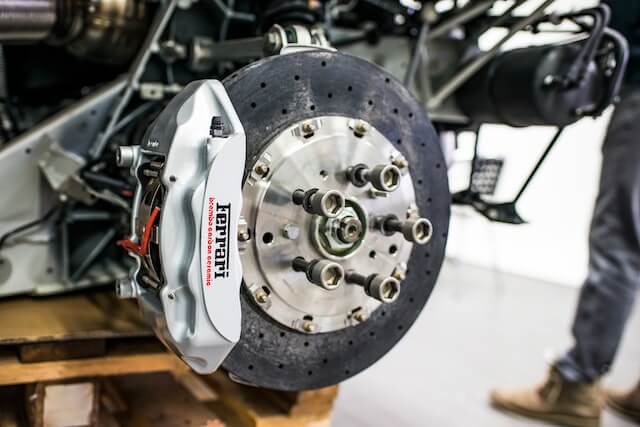Contents
How Much Does A Brake Fluid Change Cost in the UK?
How Much Does A Brake Fluid Change Cost in the UK?
Brake fluid is a hydraulic fluid that is used to transfer force into pressure, and to amplify braking force. The brake fluid allows the brake pedal to feel “solid” when you press it. Over time, brake fluid which is hygroscopic can become contaminated with moisture, which will lower its boiling point and can cause corrosion and brake failures. That’s why it’s important to change your brake fluid regularly.
The frequency of brake fluid changes will vary depending on the make and model of your car, but it's generally recommended that you change it every 12 months or so.
The average cost of a brake fluid change is £50, with prices ranging from £40 and £90. The cost of the actual brake fluid is not much but will differ depending on the type of brake fluid needed for your vehicle, i.e. glycol-based, silicon-based or more rarely mineral oil. The cost of a brake fluid change will further reduce when booked with a service with ClickMechanic. The exact price of the brake fluid change depends largely on your car and the fluid type recommended by the manufacturer.
Your location can also be a key factor in determining the price of a brake fluid change. For example, average hourly labour rates and demand in cities like London is around £50-£100 while in towns with lower demand, the labour rates can range from £35-£50. The type of mechanic, for example, a mobile mechanic vs a dealership garage technician can also affect the total cost of a brake fluid change.
Average cost of a brake fluid change by location
| Location | Average Cost |
|---|---|
| Birmingham | £61 |
| Bristol | £66 |
| Glasgow | £60 |
| Leeds | £50 |
| Liverpool | £61 |
| London | £62 |
| Manchester | £56 |
| Newcastle | £70 |
| Sheffield | £53 |
To avoid having car owners overpaying and get a fair price for a brake fluid change, we use real-time data of thousands of car makes and model data, local labour prices for brake fluid change and the fluid prices to provide an instant fair quote. Simply enter your vehicle registration number and postcode to get an instant price for a brake fluid change for your car.
Average cost of a brake fluid change by manufacturer
| Car Make | Average Cost |
|---|---|
| Audi | £71 |
| BMW | £72 |
| Citroen | £67 |
| Ford | £73 |
| Honda | £75 |
| Hyundai | £90 |
| Kia | £62 |
| Land Rover | £68 |
| Mercedes-Benz | £76 |
| Nissan | £79 |
| Peugeot | £76 |
| Renault | £78 |
| Toyota | £72 |
| Vauxhall | £71 |
| Volkswagen | £74 |
Signs your brake fluid needs to be changed
- Noticeable change in braking performance
- ABS warning light on
- Soft or spongy brake pedal
- Squealing or grinding sound when applying brake
Your brake pedal feels "spongy".
If your brake pedal feels soft when pressed, you might have a problem with your brake fluid. When you come to a stop, you may have to pump the brake pedal several times or have to press the brake pedal all the way to the floor in which case the brake fluid will need to be checked and replaced.
You see a puddle of brake fluid under your car.
If you happen to find a dark liquid pooling under the car, then it could be a sign of leaking brake fluid. This will require an inspection to find the source of the leak.
You notice that your car pulls to one side when you brake.
Whenever you brake, if your vehicle pulls left or right, it could be a sign that the brake fluid is contaminated. When this happens, it’s important to get the braking system inspected as soon as possible.
ABS light on
If brake fluid is low it can sometimes trigger the ABS or brake warning light on the dashboard under normal driving conditions.
Frequently asked questions about brake fluid change cost
Is a brake fluid change really necessary?
Yes, a brake fluid change is necessary because the fluid is used to transfer the force from the pedal to the brakes. Over time, the fluid can become contaminated and will not work as effectively which can be a safety hazard.
How often should brake fluid be changed?
Most experts recommend that brake fluid be changed every 12 months or 12,000 miles. Every vehicle is different and manufacturers have specific advice so it’s important to check the owner’s manual for guidelines on brake fluid change intervals. Not changing it at the recommended time can cause the brake fluid to lose its ability to lubricate the brake components and it can also cause corrosion.
What happens if you don’t change brake fluid?
Over time, brake fluid becomes darker, indicating contamination. The absorbed moisture lowers the fluid’s boiling point and results in moisture contamination. The moisture in the fluid causes corrosion in hydraulic components, leading to premature brake failure or making the brakes far less effective than they should be.
If the brake fluid level gets too low, your brake pedal will feel “spongy” and won’t stop your car as well as it should.
How long does a brake fluid change take?
A brake fluid change usually takes around 1 to 1.5 hours but can take less or more time. Ultimately, the time that the job will take will depend on a number of factors, like your vehicle's make and model, year, as well as other factors. Select your car at the top of this page for information on job time and cost for your vehicle through ClickMechanic.
Can I carry out a brake fluid change myself?
While a brake fluid flush is more complex, you can carry out a simple brake fluid top-up yourself. Remember it is essential to follow proper safety procedures and ensure the task is done properly, as the braking system is critical for the safe operation of your vehicle.
Unless you are a qualified mechanic with the required skills, training and equipment to do the job, we strongly recommend a brake fluid change is only carried out by a professional mechanic who will ensure the old fluid is completely flushed out and replaced with new fluid as per manufacturer recommendations. ClickMechanic can help get you a vetted and local mechanic to carry out the work. Just enter your postcode and your car's registration number at the top of this page and select the work needed to get an instant fixed price upfront.
What else could be the problem if my brake fluid does not need changing?
If you’re experiencing braking issues and your brake fluid is topped up, it could be any of the following that could be affecting overall braking performance:
- Brake pads or calipers - if brake pads are worn out, it may cause the vehicle to pull to one side when you brake. It could also be an issue with the brake calipers so it’s best to get a brake inspection done in this case.
- Brake fluid contamination - if there is no brake fluid leakage but you’re still facing performance issues then it could be that the fluid has been contaminated and will need a fluid flush
- Faulty wheel speed sensor - the ABS relies on the wheel speed sensor to prevent skidding during braking.
What happens during a brake fluid change?
- Mechanic will inspect the brake system.
- Mechanic will advise if other parts of the brake system need replacing too.
- If necessary, the mechanic will replace the brake fluid and bleed the air from the system.
- Mechanic will inspect the brake system and, if deemed safe, test drive the car.


